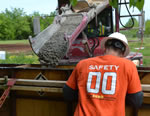Concrete Industry Management students at Middle Tennessee State University (MTSU), Murfreesboro, recently placed fresh mixes in a U-shaped concrete wall section formed the day before, continuing the ASCC Education, Research and Development Foundation-funded “Evaluation and Examination of ACI 347.3R ‘Guide to Formed Concrete Surfaces’” project.
Leading the field work on behalf of the American Society for Concrete Contractors are Dr. Ward Malisch, principal investigator, and ASCC Technical Director Dr. Bruce Suprenant. The students are part of the Senior Concrete Research class of MTSU’s Dr. Heather Brown, project co-investigator. The class has been evaluating different methods of measuring the area of air voids (bugholes) on surfaces based upon time needed for measurement; cost of measuring equipment; and, different methods’ accuracy and precision. The U-shaped structures will serve as permanent control surfaces on which multiple measurements can be made using several methods.
ACI Committee 347, Formwork for Concrete’s “Guide to Formed Concrete Surfaces” (ACI 347.3R-13) defines four quality levels of formed concrete surfaces and provides methods to achieve and evaluate them. The project was initiated to address ASCC members’ concerns with Guide recommendations for specifying concrete surfaces. Additional funding has been provided by the Ready Mixed Concrete Education and Research Foundation and American Concrete Institute’s Concrete Research Council. The ASCC Education, Research and Development Foundation was chartered in 1989 to advance the quality and productivity of concrete construction.
CONCRETE MASONRY DESIGN AWARDS
The National Concrete Masonry Association is accepting entries for the 2015 Concrete Masonry Design Awards of Excellence program through October 1. Cosponsored by the Interlocking Concrete Pavement Institute, it showcases design and construction excellence using concrete masonry and hardscape products—conventional or articulating block, manufactured stone veneer, segmental retaining wall units and interlocking concrete pavers—in residential, commercial and landscape applications. Entry forms and additional information can be obtained from NCMA, 703/713-1900; www.ncma.org.
